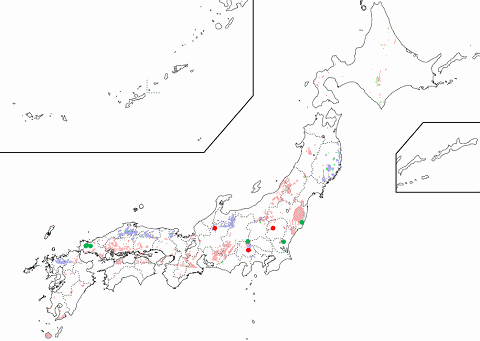High-T Hydrothermal Deposit
Chemical Process (Liquid-phase Growth) - Closed system under ground
Synonym
High-T Hydrothermal Vein Deposit, High-T Hydrothermal Ore Deposit, Hypothermal deposit
Index Minerals
Molybdenite, Cassiterite, Scheelite
Required Geological Setting
Associated metasomatic zones
High-T silicified zone, Epidote-Actinolite zone
Occurrence
Vein-type deposit formed by 300-500 degree hydrothermal fluid originated from Acidic (I-type Granite) or Neutral (Granodiorite, Diorite) I-type (magnetite-series) magmatic activities. Origin of hydrothermal fluid is magmatic water from magma. This type of deposits is formed at deep circumstances by hydrothermal fluid poor in vapor constituent whereas Pneumatolytic deposits are formed at shallow circumstances by same 300-500 degree hydrothermal fluid rich in vapor constituent. Typical elements concentrated are W and/or Sn. Host of deposits are plutonic rocks or basements of plutonic rocks. The deposit may shift to Moderately high-T hydrothermal deposit in the shallower level.

Distribution of High-T Hydrothermal Deposits described in this site. Red dots are high-T hydrothermal deposits, and green dots are those combined with skarn. Red is ilmenite-series granite, and blue is magnetite-series granite.
Mineral Assemblages (Ore)
Molybdenite, Cassiterite, Scheelite
Mineral Assemblages (Gangue)
Quartz
Localities
- Owashi Mine (Mo deposit)
- Hikage Mine (Mo deposit)
- Hirase Mine (Mo deposit)